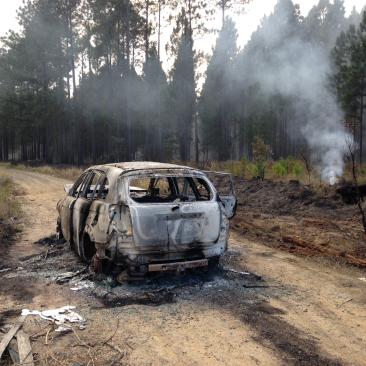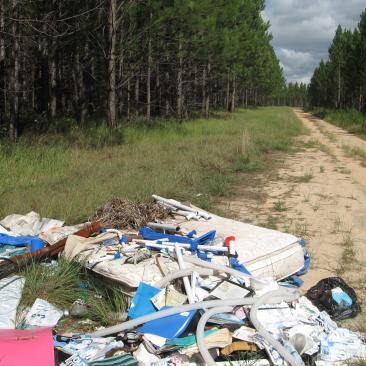Australia’s peri-urban areas, the areas surrounding metropolitan regions, are some of the fastest growing in the country, but with residential encroachment on forests comes a growing challenge for the country’s foresters, illegal dumping.
As an FSC certified forestry operation, illegal dumping presents a particular risk to HQ Plantations’ commitment to protect biodiversity and clean waterways, and provide safe working conditions for their staff.
Stephanie Hunt from HQ Plantations spoke to us about what the company have been doing to tackle this complex problem that brings together the needs of the local community, the forest, the company and its’ workers, and the government.

1. Illegal dumping of rubbish in forests appears to be a widespread problem across the country. Can you tell me a little about the problem as it occurs in HQ Plantations’ sites?
Dumped materials in our plantations include household waste and white goods or furniture, green waste, building and renovation waste, vehicles and tyres, animal carcasses, and hazardous waste including asbestos, oils and paint.
2. What do you think would surprise people about this practice?
The scale of the problem. A survey of just nine of the 25 logging areas at our 22,000 ha Beerburrum plantation estate identified 698 dump sites at a time when we were engaging a contractor to clean up two or three days a month and had run several big Clean Up Australia campaigns in the preceding years.
Almost 100 tonnes of waste have been collected at our Clean Up Australia events over the past five years (hosted at one or two locations a year) and approximately 200 sites where identifying evidence was found were reported to the Queensland Government’s Litter and Illegal Dumping Unit (LIDU) for compliance action over the same period.
3. Why are a small percentage of the community dumping their rubbish in forests?
There’s not a lot of good research into what motivates offenders but some reasons include transfer stations and tips being closed at the time of disposal, or being limited in what they will accept, or being perceived to be too far away or too expensive; our plantations are often on the way to the tip and it just seems more convenient.
Unfortunately there’s also no social pressure because people can dump rubbish in forests without being seen so people think the risk of getting caught is low.
Some people don’t seem to understand that disposing of green waste is also illegal.
When I say ‘people’, please understand it’s a very, very small percentage of the population that disposes of waste illegally and it’s certainly not the norm.
4. Why is Beerburrum a hot spot for illegal dumping?
HQPlantations’ Beerburrum plantation is particularly prone to illegal dumping due to its proximity to the small villages around the plantation, the cities of Caboolture and the Sunshine Coast, and even Brisbane; the extensive arterial road network including the M1 Motorway running through the centre of the plantation; and its many entries and exits.
Car theft and stripping is a problem in Caboolture, many of the vehicles are abandoned and torched to destroy evidence. Up to 300 vehicles a year (some years even more) are dumped at Beerburrum and most of these are torched. This accounts for about 50% of our wildfires.
5. How are HQ Plantations responding?
Education and prevention
We work collaboratively with the Queensland Government’s Litter and Illegal Dumping Unit (LIDU) on research, messaging and signage to help prevent dumping. Staff receive special training on evidence collection for compliance actions undertaken by LIDU. In lieu of fines or prosecution, LIDU may order offenders to clean up the waste they dumped, which is more beneficial for HQPlantations as we do not receive the income from fines, which goes to the government.
While the research stage of our partnership is complete, we will continue to work with LIDU on investigation and compliance.
Deterrence
We use surveillance on common thoroughfares to hot spots and have run trials on different technologies including black light that can make detecting number plates easier in low light. We also trialled live video to a control room for a patrolled vehicle response. However due to the dispersed nature of this problem, this type of surveillance is limited in its effectiveness.
Clean up
We work with police and engage a specialist contractor to remove abandoned vehicles within 24 hours. This is important to reduce the risk of torching and subsequent wildfires, if this hadn’t already occurred at the time of dumping.
We have many recreational groups that hold permits to run events in the plantations, they join us for Clean Up Australia Day each year, where we may have 200 participants or more. Contractors who meet our safety standards are also engaged to remove waste once the sites have been investigated.
Catching perpetrators
We’ve also launched Forest Watch at Beerburrum with the Queensland police. It’s a crime reporting initiative that encourages neighbours and visitors to report suspicious behaviour and provides a handy list of contact numbers and a reporting hotline to the local police for investigation. The back of the list has a reporting form to help people safely collect information that could be helpful in an investigation without disturbing evidence. We just distributed 7,500 of these to residents who live on the fringes of our Beerburrum plantation.

6. What are some of the most challenging aspects of this problem for your and your colleagues?
The most challenging problem is the open access requirements of our plantation licence and our close proximity to such a large population of over four million people within day tripping range of the Beerburrum plantation. The hundreds of entry points to our plantations also makes them impossible to monitor comprehensively.
7. As an FSC certified operation, HQ Plantations is concerned with maintaining the biodiversity of your forests, as well as protecting areas of high conservation values. How does illegal dumping present a challenge to HQ Plantations' efforts in this area?
Fires from illegally dumped and torched vehicles pose the biggest threat to both the environment and our plantation asset, hazardous waste can contaminate soils and green waste can also introduce weeds and increase wildfire risk. Our plantations areas are popular outdoor recreation spaces and aesthetic values are also compromised by the unsightly nature of illegal dump sites. Illegal waste also introduces safety risks to staff, particularly regulated waste such as asbestos.
8. Ultimately, what do you hope to see happen?
Naturally we’d like people to do the right thing and dispose of their waste at an approved transfer station or landfill site. Although we have partnerships with local government, we’d like to be able to dispose of publicly dumped waste at no cost, or at least at non-commercial rates, all the time, not just on Clean Up Australia Day. We’d also like to continue our partnerships with LIDU for compliance and recreation groups for clean up but ultimately we’d prefer that wasn’t necessary at all.
